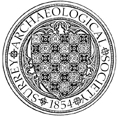Farnham Castle
Resistivity survey by FDMS, reported by K D Graham. Results seemed to indicate an 8m wide ditch running east to west to the south of the south front of the Castle and turning north round its east side (fig 2). It is probably the dry ditch referred to in medieval documents. Three possible structures were also located: one east of Fox's Tower; one possibly a turret on the curtain wall and one near the existing gatehouse. (224)


